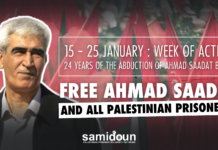The following report was written by Sylvia of the International Solidarity Movement, West Bank:
 On the 7th November 2011, founder of the Palestinian Cultural Enlightenment (Tanwer) and lecturer at the An- Najah University, Dr. Yousef Abdul Haq, was arrested from his home at two o’clock in the morning. Dr. Yousef is in his 70’s and his health has suffered from mental strain and poor prison conditions. Well known for his calm and peaceful nature, Dr. Yousef’s daughter insists that her father “will always support his people by telling the truth: a lot of people are living in poverty because they are under occupation. If my father tells the truth, eventually everyone will understand.”
On the 7th November 2011, founder of the Palestinian Cultural Enlightenment (Tanwer) and lecturer at the An- Najah University, Dr. Yousef Abdul Haq, was arrested from his home at two o’clock in the morning. Dr. Yousef is in his 70’s and his health has suffered from mental strain and poor prison conditions. Well known for his calm and peaceful nature, Dr. Yousef’s daughter insists that her father “will always support his people by telling the truth: a lot of people are living in poverty because they are under occupation. If my father tells the truth, eventually everyone will understand.”
Administrative detention is legally incompatible with basic international standards of human rights, when Israel holds the accused without charge or trial for long periods of time. The evidence of his or her offense is held in a “secret file,” which cannot be seen by the detainee or defense lawyer. The file is prepared by the Israeli intelligence service, which has gathered “evidence” by illegal means.
This has left Dr. Yousef’s family with no clue as to why he was taken in the middle of the night.
“No one has told us anything” says Yousef’s 21 year old daughter Shayma, a third year student at the An- Najah University. Dr. Yousef is a lecturer in economics and human rights and his co-creation of the Palestinian Enlightenment Project has painted him as a symbol of peaceful and intellectual freedom.
Shayma describes the last night she saw her father, the rapping of fists and unfamiliar sound of Hebrew at her door house. She remembers distinctly as he faded into the shadow of the jeeps outside her windows.
Shayma, the daughter of Dr. Yousef, poses next to her father’s portrait
“It’s strange” she said, “My father was laughing. He is as strong as iron or steel. When we talk to him, it is him who encourages us when it should be the other way around.”
On that night, the family assumed he would be interrogated then released and waited from two until six in the morning before reading in the newspaper that he would be kept under administrative detention for four months.
It is this absence of information which makes this experience so agonizing for Palestinian prisoner’s families. Now in the sixth month of his administrative detention, Dr. Yousef’s release is pushed further back from the horizon each time it comes into sight with no explanation or court hearing.
When asked what she thinks will happen, Shayma explains “We hope for something. My mother is depressed, she is worried and she can’t sleep since she has heard of how they torture inmates.”
Though the family has rare permission to visit Ofer prison inside ‘48 territory, Dr. Yousef has advised against it. The journey has been made degrading and lengthy, sometimes waiting for hours in uncomfortable conditions as a further means of adding to the suffering of the Palestinian people. “It will only make it harder for us emotionally,” Shayma explained.
Articles 42 and 78 of the Fourth Geneva Convention permits administrative detention only “if the security of the Detaining Power makes it absolutely necessary “or for “imperative reasons of security”. These terms are widely accepted as applicable to the occupied territories of Palestine. The convention articulates that all civilians, weather in occupies territories or not, are fundamentally “entitled, in all circumstances, to respect from their persons, their honor, their family rights, their religious convictions and practices and their manners and customs”. These terms can only cease after the effective end of occupation. Israel ratified the Fourth Geneva Convention in 1951 and is bound by its terms.
That Dr. Yousef’s detention denies a class of young, educated Palestinian’s of human rights lecturer is of no coincidence. Israel’s use of administrative detention to silence political figureheads is a concern raised by human rights movement Amnesty International, who explained that prisoners of conscious were being held “solely for non-violent exercise of their right to freedom of expression and association.”
“Our souls are not broken, we are hanging on”, says Shayma. As the struggle for her father’s freedom continues, she recalls her father’s advice, calling for unity and intellectual freedom.
Sylvia is a volunteer with International Solidarity Movement (name has been changed).
Discover more from Samidoun: Palestinian Prisoner Solidarity Network
Subscribe to get the latest posts sent to your email.




